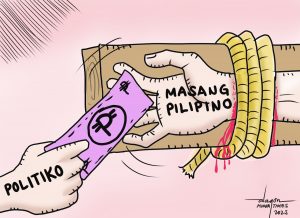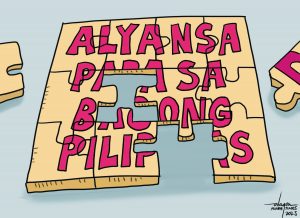LAST Sunday, as we have been doing since the prohibition of mass gathering was mandated as a consequence of the Corona Virus (CoViD) 19 pandemic, we heard mass not inside the Church but in the confines of our home through television. We got it from Veritas, the healing mass.
The celebrant of the mass was Most Rev. Broderick Pabillo, DD, Bishop of the Diocese of Novaliches who has been designated by Pope Francis as caretaker of the Archdiocese of Manila in the absence of Cardinal Juan Tagle. The latter is now at the Vatican after he was given a higher responsibility by the Pope.
Since we started hearing the virtual mass with Bishop Pabillo officiating, we cannot remember any of those occasions that he did not take a swipe at the government and President Rodrigo Duterte. We have nothing against it. After all the Bishop is also a citizen of this republic. Hence, he is equally protected by the Constitution especially in that provision where the citizen is guaranteed freedom of expression.
Every time Bishop Pabillo harangues the government and the Duterte administration, and calls on the people to be vigilant and not to remain cowering in fear under the present regime, Pabillo seeks refuge to the Charter claiming that every citizen deserves protection from the government and those who are running it.
He would always insist that instead, what is happening is, the people are now seeking protection against their own government. In all instances that the Bishop talks about death under investigation he’s always couch his statement in a manner that it is to be understood as the doings of government security forces, or that it has become a policy that he labels every such kind of death as “extra-judicial killing” or EJK.
We do not disagree with the bishop that there may be extra-judicial killings in the Philippines. And these have been happening long before the Duterte administration. Only, in the previous regimes the killings were termed in the manner of how these are being done. That is, the cause of deaths carried certain trademark that identified itself with the perpetrators.
That is, if the wounds and other physical injuries are done in certain overly angry manner, they term it “liquidation.” And this kind of attack on a person is attributed to the anti-government rebels – the New People’s Army (NPA).
But when a person is found dead with wounds, other injuries and with indications of grave torture and physical restraint, the guy is surely a victim of “salvaging.” And this kind of crime is connected to the activities of government security forces who want to exact information or admission from the suspect of a having committed a particular crime particularly rebellion.
However, when the Duterte administration came in, both “Salvaging” and “liquidation” as crime parlance, appear relegated to the dark corners. In its place in the pedestal of crime terminologies, stands out the single phrase – “extra-judicial killing.”
And no one, not even the so-called “guardians” of human rights, would want to put the blame on other sectors but only on the government itself, and the man on top — the President.
Really, we have no idea how updated the good Bishop is, and possibly, all other Church authorities on the ways of organized crime syndicates and lords of illegal drugs in the country. The Novaliches bishop should have seen the entirety of the operation of Colombian drug lord, Pablo Escobar. He should have read and digested every single aspect in the case of Mexico’s El Chapo.
Had he updated his stock of information about the two most notorious operators of drug syndicates in the Americas he could have known that the killings related to the campaign against illegal drug syndicates were mostly perpetrated by the gang men themselves.
They liquidate innocent civilians whom they suspect of providing law enforcers information about their operation. They kill every good policeman who does his responsibility of running after the syndicates. They murder top government executives including members of government prosecuting bodies, judicial officials, and officers of police and military organizations and media personalities who do not agree with their bidding.
The syndicates also generously fund operations of private organizations that later on become willing tools for the criminals to picture them as well-meaning businessmen and tag the government as oppressor and perpetrator of crimes against humanity.
Yes, last Sunday Bishop Pabillo, seemingly fully convinced that the Church has all the moral obligations to hold government responsible for every misfortune the Filipinos have into these days, again lashed out at the administration.
He told his virtual audience the reason why the Church is reproaching the government; why it is interfering in certain activities it deems disadvantageous to the people. Invoking the 1st Reading in last Sunday’s gospel Pabillo cited Jesus’ instruction to Prophet Exequiel: “You, Son of Man, I have appointed watchman for the house of Israel; when you hear me say anything, you shall warn them for me. If I tell the wicked, ‘O wicked one, you shall surely die.’ And you do not speak out to dissuade the wicked from his way, the wicked shall die for his guilt, but I will hold you responsible for his death. But if you warn the wicked, trying to turn him from his way, and he refuses to turn from his way, he shall die for his guilt, but you shall save yourself.”
Clearly, the protestations of the Church against the administrations and its ways, are well-grounded.
There is need for everyone to be his brother’s keeper. And that again falls under last Sunday’s Gospel that talks about “fraternal correction.” It is about winning our brother/sister to the Lord. That is to bring the person “back to the community, the family, and the fold of Christ”.
And to effectively do this the Gospel talked of a process: first to reach out; second to open hearts to reconciliation; and third, for the Church to serve as the “go-between.” In fact in one of Pope Francis’ pronouncements he said that the Church is like a “field hospital” where one can find first aid and rehabilitation while in the field of battle in this earthly life. The Church is sent not to condemn, but to give mercy and compassion, and at times to intercede on behalf of the sinners.
Unfortunately, as far as we can remember of our own chronicling of the differences between the government and the Church in the Philippines, we feel that the process as mentioned in the Gospel has not been followed. In fact, instead of “reaching out” the manner with which interference or “intercession” had been manifested is more confrontational and blaming.
In this manner therefore, how can there be “opening of hearts for reconciliation; and the Church cannot any more effectively act as ‘go-between’ because clearly, it is already a player in the conflict. Therefore, we believe that Pabillo’s rationalization of the Church interfering in government policies and its implementation may now need some reconciliation with the source of his invocation.



